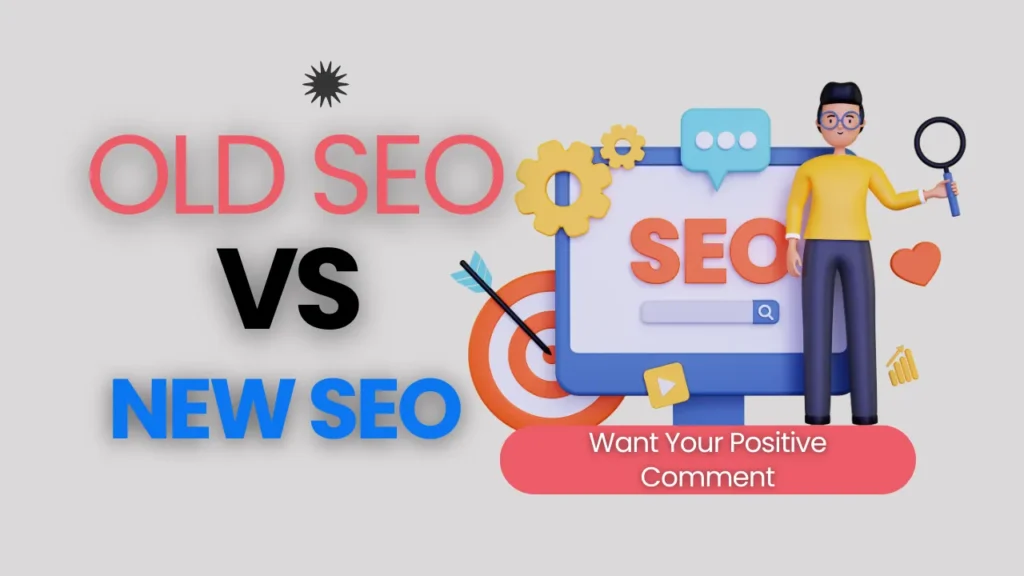Understanding the Shift in SEO
Many people are still using outdated SEO techniques without realizing how much has changed. Search engines evolve constantly, and methods that once worked years ago can now hurt your rankings. This article compares old vs new SEO practices to help you understand what to leave behind and what to focus on today.
1. Stop Obsessing Over Keyword Density
The idea of maintaining a specific “keyword density” — like using a keyword 10 or 20 times per page — is outdated. Search engines are smarter now. You don’t need to repeat your main keyword over and over.
Instead, use LSI (Latent Semantic Indexing) keywords — words and phrases that are related in meaning to your main keyword. They help Google understand your topic better while keeping your content natural and readable.
If your main keyword doesn’t appear too many times, it’s perfectly fine. What matters most is context and clarity, not keyword repetition.
2. Focus on Quality, Not Length
In the past, long articles with 3000–4000 words were considered better for ranking. That’s no longer true. Today, clarity and usefulness matter more than word count.
Search engines now prefer concise, well-structured content that gives readers exactly what they’re looking for. Writing long paragraphs full of filler words can actually hurt user experience.
If your article crosses 1000 or 2000 words, make sure every sentence adds value. Explain your topic clearly, provide direct solutions, and remove unnecessary fluff.
3. Make Your Content Easy to Read
People don’t want to scroll endlessly through long blocks of text. Keep your sentences short and your paragraphs clear. Avoid large “walls of text.”
Use headings, bullet points, and proper grammar. Good punctuation and formatting are part of SEO now because they improve user experience. The easier your article is to read, the longer people stay on your page — and that helps your rankings.
4. Forget About SEO Plugin “Green Lights”
Many beginners rely too heavily on SEO plugins that show red, yellow, or green lights. These tools are helpful, but they don’t decide your rankings.
Search engines don’t care about plugin scores. What really matters is how users experience your content — the readability, structure, and how well it satisfies their intent.
Don’t write for tools. Write for people. Use SEO plugins as a guide, not a rule.
5. Old Link Building Methods Don’t Work Anymore
Free backlink methods are almost useless today. Most free links are spammy and can even harm your site. The reality is that high-quality backlinks are paid or earned through valuable content.
You can get good backlinks through guest posts, niche edits, and content partnerships, but these usually require some investment or effort. Random free backlinks from directories or comments won’t help anymore.
6. Internal Linking Still Matters — If Done Right
Many people misunderstand internal linking. Simply placing a few random links at the bottom of your article doesn’t help.
Effective internal linking means connecting relevant pages within your content naturally. When a reader clicks on a related topic, they should land on another helpful article on your site. This not only improves user experience but also helps search engines understand your site’s structure.
Make sure your links appear contextually inside your paragraphs, not as random lists.
7. Keep Your Content Updated
Another big mistake is ignoring old content. Some people believe that just changing a publish date makes an article “fresh.” That doesn’t work.
Search engines recognize truly updated content — meaning you’ve added new data, insights, or examples. Review your older posts, add current information, improve readability, and remove outdated references.
Freshness now means genuine improvement, not just changing dates.
Final Thoughts
SEO in 2025 is all about understanding user intent, improving experience, and maintaining authenticity. Forget shortcuts and outdated tricks. Focus on creating content that genuinely helps readers and provides clear answers.
If you stop worrying about green lights, keyword counts, and cheap backlinks — and instead focus on quality, relevance, and structure — your SEO results will naturally improve.
FAQs
1. Does keyword density still matter in SEO?
No. Search engines now focus on meaning and context rather than how many times a keyword appears. Use related words and phrases instead.
2. How long should an article be for SEO?
There’s no fixed length. Focus on clarity and value. A 1000-word article that fully answers a query can outrank a 4000-word one filled with fluff.
3. Are free backlinks useful anymore?
Most free backlinks have little to no value. Focus on quality backlinks earned through guest posting, content outreach, or trusted sites.
4. What is the right way to do internal linking?
Add links inside your article that lead to relevant pages on your site. This helps users explore related topics and improves site navigation.
5. How often should I update my old content?
Review your articles every few months. Add new data, fix outdated information, and make improvements to keep your content fresh.


Leave a Reply